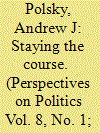| Srl | Item |
| 1 |
ID:
145949


|
|
|
|
|
| Summary/Abstract |
The next Administration will want to examine the last 15 years of strategic performance to improve sound strategy options and to promote timely re-assessment and adaptation of approved policies and strategies. Building off of two recent studies of U.S. decisionmaking and policy implementation at the strategic level, this article examines proposals to enhance the quality of policy making and implementation oversight mechanisms at the National Security Council. Major recommendations are offered to improve interagency planning and the creation of an inter-agency community of national security professionals.
|
|
|
|
|
|
|
|
|
|
|
|
|
|
|
|
| 2 |
ID:
096285


|
|
|
|
|
| Publication |
2010.
|
| Summary/Abstract |
Military stalemate in Iraq and Vietnam presents a puzzle: why do presidents persist in a strategic course that has failed to secure the goals they defined when they chose to embark upon war? In the face of a quagmire, presidents might choose among three broad strategic options-disengagement, escalation, or continuity. I argue that the first alternative, to withdraw, is made impossible by the inflated rhetoric presidents invoke to sell a skeptical public on the necessity for a limited war and by their own conviction (reinforced by core supporters) that the price of defeat is too great. At the opposite pole lies the possibility of full-scale mobilization. But because presidents during the Vietnam and Iraq wars believed they could also pursue expensive domestic agendas, they did not reserve the resources needed for large-scale escalation. In the both cases, too, civilian leaders were deeply skeptical about their military counterparts and discounted their caution that a greater military commitment would be needed. Finally, as wars drag on, public disenchantment prevents presidents from mustering the political support escalation would require. Their early decisions thus leave them with no alternative to their current strategic commitment.
|
|
|
|
|
|
|
|
|
|
|
|
|
|
|
|